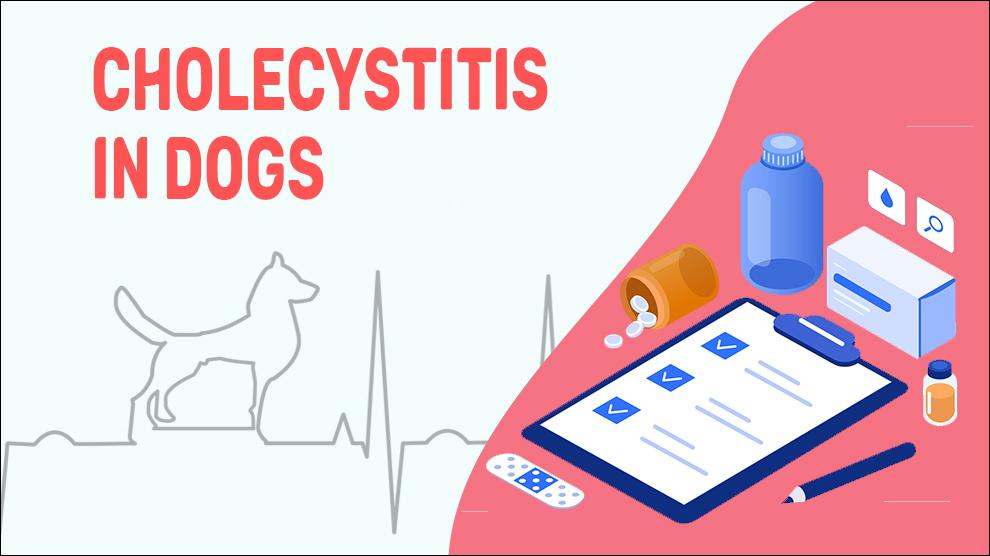“Cholecystitis" by definition means inflammation of the lining of the Gallbladder. Actually, this is a broad term that is also attributed to blunt abdominal trauma, infection (bacterial or parasitic), cystic artery thrombosis, neoplasia, or cystic duct occlusion (e.g. cholelithiasis).
This disease terminology really sounds odd and so are the symptoms, they also present really vague symptoms. Besides these names, multifactorial nature and several different causes of the disease exist, which all have their own names.
Moreover, sometimes other disorders/conditions can occur at the same time as Cholecystitis, which makes identifying the cause of the symptoms rather difficult. The etiology of cholecystitis is well described in dogs.
Most commonly, Cholecystitis in dogs occurs due to a bacterial or viral infection.
Symptoms Of Cholecystitis
- Enlargement of the gall bladder.
- Hyperthermia
- Abdominal fluid accumulation
- Anorexia to different degrees.
- Hyperbilirubinemia
- Hypercholesterolemia
- Weight loss, Dehydration
- Vomiting, Diarrhea
- Icterus (jaundice).
- Right-sided discomfort upon examination.
- Inappetence
Treatment Options For Cholecystitis
Treatment depends on the cause.
Broad-spectrum antibiotics are initially started and once cultures and blood tests have been obtained, then the antibiotic choice may be changed.
For the anorexic, nauseated, and systemically ill dogs, hospitalization for supportive therapy such as intravenous fluids might be required.
When infectious cholecystitis exacerbates immune-mediated complications - corticosteroids (prednisone, prednisolone, dexamethasone, triamcinolone) and other immunomodulating medications (such as Cyclosporine (CSA), Azathioprine, Mycophenolate mofetil) are provided.
Gall Bladder Stones:
- Surgical removal - Cholecystectomy.
- Non-surgical removal - Urohydropropulsion (special catheter with a saline solution flushed through the bladder to expel the stones).
- Dietary dissolution: High-protein, Low-fat diet.
Bile Duct Cancer: Surgery, chemotherapy, radiation, or a combination of these treatments.
Benign bladder polyps are usually surgically removed.
Home Remedies For Cholecystitis
If your dog is not a big fan of water, encourage water intake by placing water bowls, and a water fountain nearby.
Add flavor to water (bone broth or chicken broth) or add wet food to his food ration.
Prevention Of Cholecystitis
Prevention from canine cholecystitis can be done only by preventing underlying causes. Pet owners should discuss how to prevent the possibility of gallbladder disorders with the vet.
Affected Breeds Of Cholecystitis
There is no breed disposition. Female dogs are at a much higher risk of infection.
Additional Facts For Cholecystitis
- Causes:
Bacteria:
- Salmonella - spread through contaminated food, easily passed by dogs in their saliva and feces.
- Campylobacter jejuni - This microaerophilic enteric bacterium’s transmission is through undercooked or contaminated meat/meat products and raw milk.
- Coccidiosis - This protozoan parasite destructs your dog’s intestinal walls, transmission through eating dirt or feces infected with coccidia.
- Streptococcus spps - This facultatively anaerobic is commonly found in the throat and skin that occasionally turns into an infection (like humans - strep throat).
Conditions that can cause the bacterial movement in a bile duct:
- Cholestasis (decrease in bile flow or complete stopping).
- Inflammatory bowel disease (IBD).
- Gallbladder stones
- Chronic pancreatitis (inflammation of the pancreas).
- Unhealthy gut
- A weakened immune system.
Other Causes:
- Chronic interstitial nephritis (a form of kidney disease).
- Tumors
- Gallstones
- Thickened Gallbladder secretions that are unable to be excreted by your dog.
- Disorders that impede bile flow.
- Types:
- Non-necrotizing - They are asymptomatic.
- Necrotizing (Gangrenous) - Severe form of Perforation of the gallbladder wall and necrosis because of progressive vascular insufficiency and ischemia.
- Emphysematous: Also called clostridial cholecystitis, this is a fulminant variety of an acute infection in the lumen or gallbladder wall caused by gas-forming organisms such as E Coli and Clostridium species.
- Mortality:
Potential complications of cholecystitis, if not treated, are serious and can be life-threatening.
- Diagnosis:
- Endoscopic Retrograde Cholangiopancreatography (ERCP).
- Percutaneous Transhepatic Cholangiogram (PTCA).
- Urinalysis and bloodwork
- Serum Biochemistry Profile
- X-rays
- Ultrasound, CT scan
- Prognosis:
The outcome of Cholecystitis treatment is based on the etiology. If left untreated, it can lead to sepsis and will be life-threatening. When the obstruction is due to chronic liver pathology, the prognosis is usually poor. Obstructions of bile ducts caused by cancer often have a worse prognosis.
Proper diagnosis of this disease is always best left to your vet to make sure that it is not progressing into a serious form.
When To See A Vet
The dog may be as asymptomatic or show fewer signs or it may be very obvious, depending on the severity and the specific dog.
It is abnormal for cystitis to manifest signs of systemic infection (such as fever or lethargy); when this happens, it means a more serious condition (such as a bile duct cancer) is prowling inside.
An appropriate diagnosis of this disease is always best left to your vet to make sure that it is not progressing into a serious form.
Food Suggestions For Cholecystitis
- Appropriately formulated fresh food diet.
- A big ‘NO’ to dry foods.
- Protein (moderate levels of bioavailable protein).
- Leafy greens, fresh vegetables, and antioxidants.
- Add safe dairy products (cottage cheese, ricotta cheese, and yogurt).
- Omega fats: Omega-6 and Omega-3 in a 4:1 ratio.
- Low in Phosphorus (0.2% - 1% dry matter).
- Regulated treats that are part of the daily calorie intake.
- Avoid foods high in copper (organ meats).
Conclusion
As in many cases, the cholecystitis etiology is often serious in nature and it can be treated efficiently if it is diagnosed early.
There is no evidence to support the reoccurrence of cholecystitis. However, always follow the progress with regular checkups and keep an eye on any appearance of symptoms you noticed in the past.

















